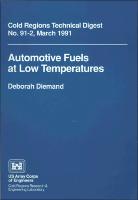Please use this identifier to cite or link to this item:
https://hdl.handle.net/11681/2679| Title: | Automotive fuels at low temperatures |
| Authors: | Diemand, D. (Deborah) |
| Keywords: | Fuel Gasoline Vehicles Motor fuels Diesel fuels Low temperature Low temperature effects |
| Publisher: | Cold Regions Research and Engineering Laboratory (U.S.) Engineer Research and Development Center (U.S.) |
| Series/Report no.: | Cold regions technical digest ; 91-2. |
| Description: | Cold Regions Technical Digest Introduction: Problems with fuels at extremely low temperatures are largely due to wax formation, increased viscosity, decreased volatility and contamination by water. This is especially true of diesel fuels, but even gasoline suffers from these problems to some extent. Some difficulties may begin to appear at temperatures above 0°C. The overwhelming majority of fuels are derived from petroleum crude oils. Straight-run fuels are produced through primary distillation of these crude oils. In addition, secondary processing of the crude produces further fuel stocks from other fractions that could not otherwise be used as fuel. Cracking reduces large molecules into smaller fragments, which may be used in the lighter fuels such as gasoline; alkylation produces larger molecules from light gases or from the lighter products of the cracking process; polymerization is similar to alkylation but results in products with a lower octane rating; reforming catalytically alters certain low-octane substances, resulting in a high-octane product. |
| Rights: | Approved for public release; distribution is unlimited. |
| URI: | http://hdl.handle.net/11681/2679 |
| Appears in Collections: | Technical Digest |
Files in This Item:
| File | Description | Size | Format | |
|---|---|---|---|---|
| CRREL-TD-91-2.pdf | 1.44 MB | Adobe PDF |  View/Open |